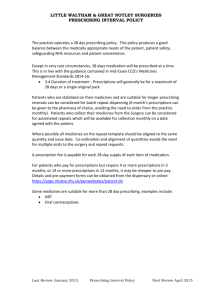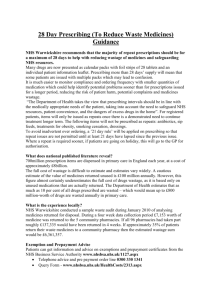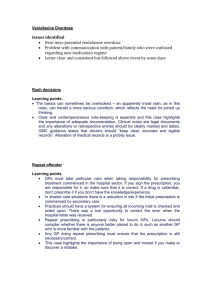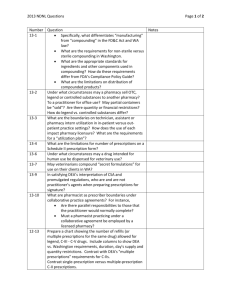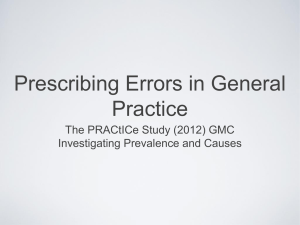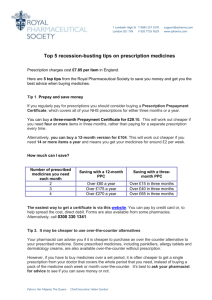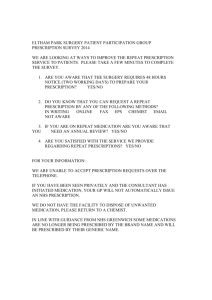GUIDELINES FOR GOOD PRESCRIBING
advertisement
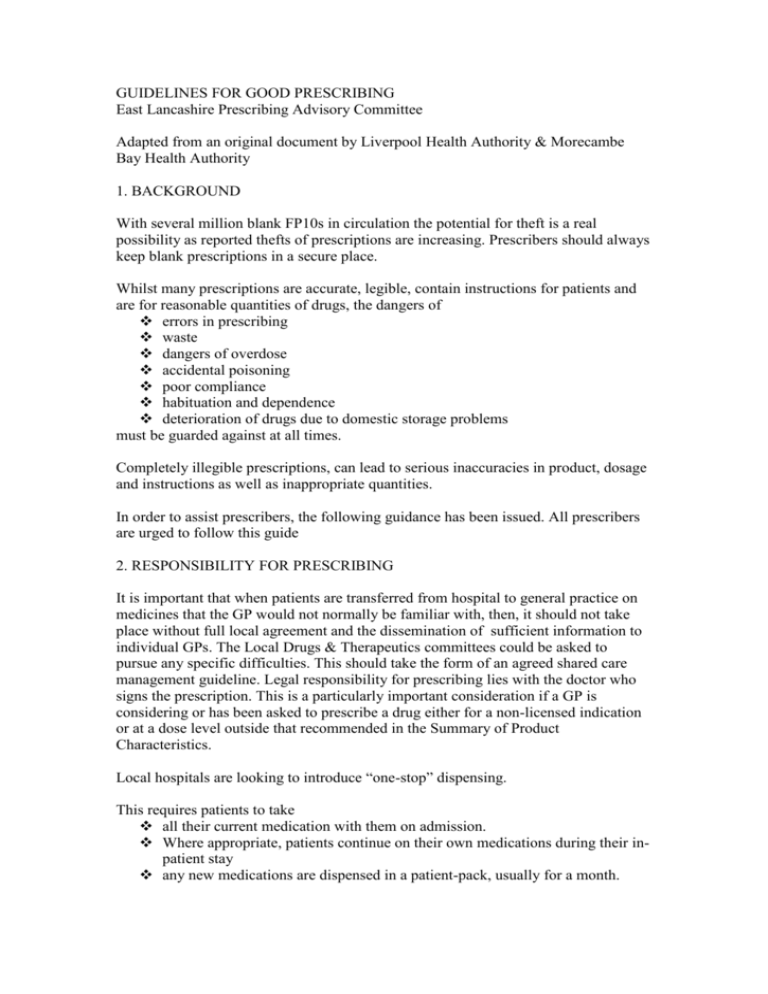
GUIDELINES FOR GOOD PRESCRIBING East Lancashire Prescribing Advisory Committee Adapted from an original document by Liverpool Health Authority & Morecambe Bay Health Authority 1. BACKGROUND With several million blank FP10s in circulation the potential for theft is a real possibility as reported thefts of prescriptions are increasing. Prescribers should always keep blank prescriptions in a secure place. Whilst many prescriptions are accurate, legible, contain instructions for patients and are for reasonable quantities of drugs, the dangers of errors in prescribing waste dangers of overdose accidental poisoning poor compliance habituation and dependence deterioration of drugs due to domestic storage problems must be guarded against at all times. Completely illegible prescriptions, can lead to serious inaccuracies in product, dosage and instructions as well as inappropriate quantities. In order to assist prescribers, the following guidance has been issued. All prescribers are urged to follow this guide 2. RESPONSIBILITY FOR PRESCRIBING It is important that when patients are transferred from hospital to general practice on medicines that the GP would not normally be familiar with, then, it should not take place without full local agreement and the dissemination of sufficient information to individual GPs. The Local Drugs & Therapeutics committees could be asked to pursue any specific difficulties. This should take the form of an agreed shared care management guideline. Legal responsibility for prescribing lies with the doctor who signs the prescription. This is a particularly important consideration if a GP is considering or has been asked to prescribe a drug either for a non-licensed indication or at a dose level outside that recommended in the Summary of Product Characteristics. Local hospitals are looking to introduce “one-stop” dispensing. This requires patients to take all their current medication with them on admission. Where appropriate, patients continue on their own medications during their inpatient stay any new medications are dispensed in a patient-pack, usually for a month. This is used whilst they are an in-patient, and then taken home on discharge. By operating this system, much confusion is avoided as patients continue with the medication with which they are familiar, wastage is reduced and unnecessary duplication of medications on discharge avoided. Please ensure that your patients know to take their medications into hospital with them for planned admissions. 3. BASIC RULES FOR ALL PRESCRIPTIONS 1. Ensure prescriptions are typed or written legibly in INK. Do not include too many items on one form. 2. Ensure prescriptions are signed, but only after completion. 3. DO NOT sign blank prescription forms. 4. Ensure that clear directions are given for each item prescribed. 5. Ensure that the strength of each item is stated. 6. Ensure that the quantity to be dispensed is clearly stated – FOR SOLID DOSES USE THE NUMBER OF DAYS BOX WHENEVER POSSIBLE. 7. Always complete the age box. 8. Avoid adding additional handwritten items to computer generated prescriptions. 9. All alterations and additions must be signed by the prescriber. 10. Always document prescriptions either on the patient’s records or on a repeat prescription card system. This will help to ensure that unnecessary duplicate repeat prescriptions are avoided and will assist in preventing drug abuse. 11. Ensure that repeat prescriptions are reviewed regularly. 12. Where an urgent prescription has been telephoned to a pharmacy, the FP10 must be with the pharmacist within 72 hours. This is a legal requirement. 4 GUIDELINES FOR QUANTITIES TO BE ISSUED I. Normally no more than one or two weeks’ supply for acute conditions, where applicable. For infections, a short course of only 3-5 days is likely to be appropriate. II. Normally no more than 28 days’ supply of medicines for non-acute conditions. III. For some patients well stabilised on treatment and under regular review, the quantity should be limited to a maximum of 3 months’ supply. The issue of 3 separate prescriptions for a month at a time, while generating 3 dispensing fees, may be more economical than one prescription covering the whole 3 month period. IV. For the oral contraceptive pill, prescriptions should normally be for 3 to 6 months’ supply. A) Conditions where longer supplies might be considered for well stabilised patients under regular review. Hypertension Epilepsy Diabetes Thyroid disorders Chronic musculoskeletal conditions Hormone Replacement Therapy Endocrine disorders Long term neurological conditions Colostomy & surgical applicance (rubber items tend to deteriorate) Up to 3 months supply should be met by issuing separate prescriptions for one month at a time. B) Examples of conditions where no more than one month’s supply should be considered. In many instances smaller quantities might be appropriate. Controlled Drugs Psychotropic Drugs Most Initial Prescriptions C) Original Pack (OP) Dispensing Please avoid using the term OP in order to avoid confusion with the term Patient Packs. 5. REPEAT PRESCRIBING Repeat prescribing accounts for a proportionally high percentage of the annual medication per patient, of which there is frequently an unacceptable level of wastage. Careful audit of prescriptions issued to nursing and residential homes can show substantial savings of prescribing costs when repeat prescriptions are tailored to the same time cycle, ideally 28 days. Special care needs to be taken with amounts of medication supplied labelled “prn” Repeat prescription requests should be instigated by the person in charge of the home or their deputy, not the community pharmacist. No regulation of repeat prescribing can prove effective unless all members of practice staff are aware of the importance of a review regime, and the reason for it. Practices with computers will find an easy method of limiting the number of prescriptions the machine will issue without further authorisation. Patients should be given ample warning of when review will be necessary, to avoid inconvenience. Practices should review their management of repeat prescribing with regard to:Volume of drugs prescribed particularly if prescribed on a ‘prn’ basis. Duration of prescription cycle (monthly prescriptions might reduce wastage). Relevance of repeat prescribing. Relevance of original pack size. Inequivalence of quantities of different drugs prescribed on the same FP10 to cover the same period of time. 6. Frequency of patient review. 7. Method of ensuring regular review. 8. Practice staff familiarity with the review requirements. 1. 2. 3. 4. 5. To avoid misunderstandings and improve compliance, it may be valuable to issue written guidance on these issues to all members of staff. This may also be helpful in explaining any changes of policy to patients. 6. MULTIPLE PRESCRIBING MULTIPLE PRESCRIBING IS A BREACH OF YOUR TERMS OF SERVICE. For every patient who requires a medicine each patient MUST have his or her own prescription. DRUGS NOT AVAILABLE FOR PRESCRIBING ON THE NHS It is a breach of the Terms of Service for both doctors and pharmacists to prescribe and dispense blacklisted drugs. Such prescriptions are disallowed for payment. THE PHARMACIST Foster a good working relationship with your local pharmacist. He or she can be of great value to you and help you in your prescribing. Do not object if the pharmacist contacts you if he/she spots an error. We are all human and mistakes are easily made. For advice about drug interactions and other pharmaceutical advice contact your local pharmacist. 7. CONTROLLED DRUG PRESCRIPTIONS It is an offence for a doctor to issue, or a pharmacist to dispense, any prescription for a Controlled Drug unless it meets ALL the required Regulations:1. 2. 3. 4. FORM of Preparation, for example, tablet or capsules NAME of Preparation STRENGTH of Preparation (where necessary) DOSE – vague terms such as a prn, mdu, sos, etc., are NOT acceptable as doses. 5. TOTAL QUANTITY in both WORDS and FIGURES. N.B. The number of days supply is NOT acceptable unless the dose happens to be one daily. 6. SIGNED and DATED by the PRESCRIBER. 7. IN OWN HANDWRITING The details listed about (1) to (6) including the patients name and address should be written in the doctors own handwriting. N.B. Phenobarbitone, Phenobarbitone Sodium or preparations containing this drug are exempt from ‘own handwriting’ rules but must still be signed and dated by the prescriber. Other Conditions on Controlled Drugs: 8. NO REPEATS are allowed, even on private prescriptions. 9. Prescribers must use FP(10)MDA prescriptions to order the supply of Methadone etc. in daily instalments. FFP(10)MDA prescriptions must not be used for single amounts. 8. AFTER PRIVATE REFERRAL The responsibility for prescribing rests with the doctor who has clinical responsibility for a particular aspect of the patient’s care. Where, for instance, an NHS doctor refers a patient (privately or otherwise) to a consultant for advice but, when appropriate, retains clinical responsibility, he/she should issue the necessary prescriptions and at NHS expense. People who opt to be referred privately (i.e. outside the NHS) are expected to pay the full cost of any treatment they receive in relation to the referral, including that of any drugs and appliances. Where the consultant has clinical responsibility, for example, where he administers the drug, or the treatment is recognised to be a specialist one, he/she should issue the prescriptions, and at the patient’s expense, if the referral or consultation is on a private basis. N.B. Treatment in respect of subfertility is a case in point and therefore GPs should not be asked to prescribe. Following a private consultation, there is no obligation for the GP to prescribe the recommended treatment if it is contrary to his/her normal clinical practice. 9. IMMUNISATION FOR HOLIDAY & BUSINESS TRAVEL ABROAD Guidance for GPs on risk assessment for travellers and appropriate advice is contained in the document “Health Information for Overseas Travel” (UK Department of Health, London: HMSO 1998) Immunisations which are available for reimbursement under the GP Terms of Service are provided free of charge to patients who require them (e.g. hepatitis A and typhoid). In the case of immunisations for conditions for which there are no arrangements for reimbursement e.g. hepatitis B, rabies, GPs may charge patients directly. This is an exception to the rule which precludes GPs from charging patients for treatment under the NHS. Newer (and more expensive) vaccines should normally only be provided at NHS expense if they are demonstrated to be of improved efficacy or when there are other compelling clinical advantages. Advice will be issued as new products arise. 10. MALARIA PROPHYLAXIS The Department of Health has issued guidance (FHSL(95)7) that medication for malaria prophylaxis may not be reimbursed under the NHS. Medicines for the prevention of malaria (except for “Maloprim” and mefloquine) are available for purchase “over the counter” at community pharmacies. “Maloprim” and mefloquine are prescription only medicines and should be prescribed on private prescription. Local community pharmacies have access to up to date advice about appropriate prophylactic regimes and can advise travellers accordingly. Patients should be advised to purchase sufficient prophylactic medicines to cover the period of their travel, commencing one week (two and a half weeks for mefloquine) so that if adverse events occur there will be time to switch to an alternative before departure and continuing for at least four weeks on return. The importance of mosquito nets, suitable clothing and insect repellents to protect against being bitten should be stressed. Remember the PHLS Malaria Reference Unit four steps to prevent suffering from malaria in UK travellers: 1. Awareness: know about the risk of malaria 2. Bites by mosquitoes: prevent or avoid 3. Compliance with appropriate chemoprophylaxis 4. Diagnose: breakthrough malaria swiftly and obtain treatment promptly 11. TRAVEL ABROAD Under NHS legislation, the NHS ceases to have responsibility for people when they leave the UK. However, to ensure good patient care the following guidance is offered. People travelling within Europe should be advised to carry an E111. GPs are not responsible for prescription of items required for conditions which may arise while travelling e.g. travel sickness, diarrhoea. Patients should be advised to purchase these items locally prior to travel. Advice is available from community pharmacists if required. For conditions unresponsive to self medication the patient should normally seek medical attention abroad. Emergency travel kits are available in two forms. The “basic” kit contains items such as disposable needles and syringes, IV cannulae, sutures and dressings. The “POM” kit contains additional items such as plasma substitutes and medicines. A private prescription is required for the latter. The kits, or a list of suppliers, are available through community pharmacies. Neither kit is available under the NHS. What can a GP prescribe for a patient travelling abroad? There is no direct legislation which deals specifically with the time period for which a prescription is prescribed for a patient who is leaving the country. However, advice received from the NHS Executive was reported in March 1999’s edition of Drug Talk. 1) No more medicine should be provided to a patient than is clinically appropriate. For instance, if a patient requires medical review within a fourweek period then only four weeks’ supply of medicine should be given and the patient should be advised to seek medical opinion in the country to which they are travelling. 2) Up to a maximum of 3 months supply of treatment can be prescribed, if clinically appropriate. This is in accordance with the advice that if a patient is leaving the country, for a period of at least 3 months, then he/she shall be removed from the doctor’s list (3 months from the date on which the HA first receives notification of the departure). 3) If a patient wishes to have more than 3 months supply, due to an extended period of working or living abroad, then the GP may issue a private prescription for further supplies of medicines to be purchased, by the patient, for treatment beyond the 3 month period. 12. PRESCRIBING OF BORDERLINE FOODS AND DIETARY PRODUCTS Prescribing of borderline foods and dietary products should comply with the recommendations of the Advisory Committee on Borderline Substances (ACBS): “Prescriptions for such products on FP10s are regarded as drugs for the treatment of specified conditions. Doctors should satisfy themselves that the products can safely be prescribed, that patients are adequately monitored and that, where necessary, expert hospital supervision is available”. A complete list of conditions can be found in the BNF or Drug Tariff. Most conditions can be included in the following categories: Metabolic disorders Malabsorption states Liver disease Specific skin disorders Dysphagia Gastrectomy Malnutrition (disease-related) Inflammatory Bowel Disease Renal failure There are several areas where prescriptions for dietary products do not comply with the above recommendations and the responsibility lies with individual GPs who may use their judgement to make exceptions to the above recommendations. This may occur following recommendations from a dietician (strongly recommended) or for a medical condition requiring nutritional support for a defined period of time. An example of the latter would be a patient having had maxillo-facial surgery, being discharged from hospital with a wired jaw and requiring nutritional support for 6-8 weeks post-operation. Such a patient would be unlikely to receive adequate nutrition from a manageable volume of liquidised foodstuffs.
